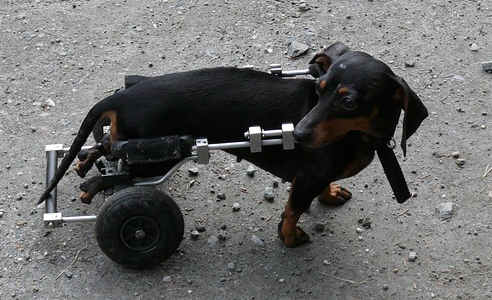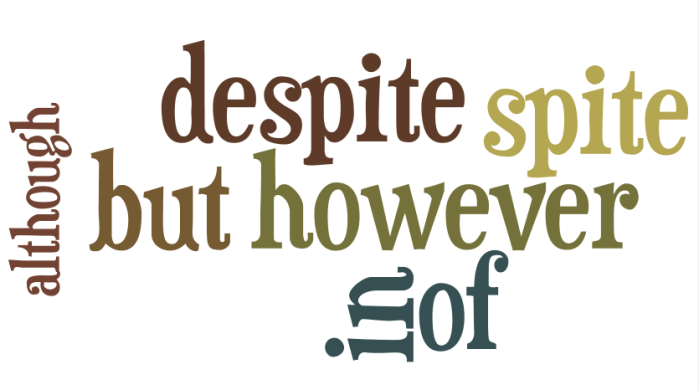Most people find it challenging to use the term «despite» in their sentences. This is because it can be confusing when it comes to putting a verb or noun in front of it. There are two patterns when it comes to the use of «despite.»
The term «despite» implies that something happened instead of the other thing that might have stopped it from happening. It can be used to express defiance and the ability to ignore the apparent odds. In other words, the thing that happened is either surprising or unexpected.
The word «despite» can also express contempt, meaning, the feeling or the attitude of despising something or someone.
You can say or write despite doing something, for example:
- He won the game despite the swollen right hand.
You can say or write despite an inevitable fact, like the example:
- He won the game despite the fact that his right hand was swollen.
It would also be best if you do not write or say the following.
- He won the game despite the right hand being swollen.
Also, don’t confuse in spite of with despite. Therefore, you should not write or say despite of.
If you are among those who find it difficult to use «despite,» you’re on the right track. This article will address various issues regarding the use of «despite.» The profound insights will enable you to understand the common mistakes either you or people make in their sentences. All that you are required to do is read the post to the end.
«Despite» Definition
As said above, the term means something that happened instead of the obvious. Hence it happened without being undeterred with known circumstances. It can be used to express the conquering aspect or the defeated feeling.
The conquering aspect implies the hurdles one or something has overcome. On the other end, the defeated feeling means trying your best for something to succeed, but all goes in vain. Therefore you should not confine yourself to the positive aspect when using «despite» in your sentences. «Despite» can also be used to express negativity. You can also use «despite» to express contempt.
Synonyms Of «Despite»
Like every other English word, «despite» has some synonyms. But it would be best if you be careful since not every synonym has the same meaning as «despite.» The following are some of the synonyms:
- Undeterred by
- Notwithstanding
- In defiance of
- Without being affected by
- In the face of
- Regardless of
- Even with
- For all
After knowing the basics of the term, the definition, and synonyms, it’s time to put theories into practice. You need to work on your sentences.
Before anything, it should be noted that both «despite» and in spite of are referred to as contrast words. And in most cases, they mean the same thing. Below is some of the common mistake that is made by most people in their sentences:
- Despite being annoyed, Sam did not fight. (The sentence is incorrect)
But why is it grammatically incorrect? It should be noted that the term «despite» is a preposition but not a subordinating conjunction. Meaning after the term, the user should put nouns; hence he or she should not place clauses that have subjects and verbs such as «he was annoyed, Sam did not fight.»
In Spite Of Vs. Despite
In the English language corridors, in spite of and «despite» are common. Many people ask themselves whether there’s a difference between the two. The answer is straightforward; the two terms are identical when it comes to the application framework. They mean «even though,» «regardless of,» or «notwithstanding.» Ensure their usage is compatible with the underlying meaning.
Where Can «Despite» Or «In Spite Of» Come In A Sentence
Both «in spite of» and «despite» are referred to as contrast showing prepositions. They can be used at the start of a sentence or in the sentence. What the user is required is an extra clause to exhibit the flip side. This implies that «despite» or in spite of are dependent clauses, they need independent clauses to be complete. For instance:
- Despite his fear, he wrapped his hands around her.
Despite his fear- dependent clause. He wrapped his hands around her- independent clause.
- My vacation was incredible, despite the sunny weather.
My vacation was incredible- independent clause. Despite the sunny weather- dependent clause.
In spite of can be replaced by «despite,» what is vital in this situation is the independent clause. This is the clause that stands alone in the sentence. It provides balance to the dependent clause. Therefore in your application, ensure that the sentence has both the independent and dependent clauses.
What Comes After «Despite» Or «In Spite Of?»
Not every sentence that needs these prepositions; some can be independent without them. In most cases, there are three options when it comes to these phrases.
- Noun
- Despite his temper, Sam did not fight.
The sentence is correct since «temper» is a noun. But if you want to use subjects such as he or she or verbs like was, then subordinating conjunctions such as though, although, while, and even though should be used.
For example:
- Although he was annoyed, Sam did not fight.
- Even though she had a swollen muscle, she continued with the game.
- Though the party did not have drinks, the guests enjoyed it.
«Despite» can also be used to express the above sentences. But this is applicable only on nouns. See the examples below:
- Despite his temper, Sam did not fight.
- Despite her swollen muscle, she continued the game.
- Despite the lack of drinks, the party was victorious.
- Gerund
Here you are supposed to change verbs such as run into nouns by adding form –ing, hence, running. The form –ing, which is used to change verbs to nouns, is known as a gerund. When it comes to «despite,» gerunds are supposed to come after the preposition. For instance:
- Despite he had no money, he contributed some bucks.
The sentence is incorrect since he had is a begin clause.
- Despite having no money, he contributed some bucks.
The sentence is correct because «having no money» is a gerund phrase. «He» has been removed hence making it not to be a clause. Because a gerund is treated as a noun, the sentence falls under the category of despite + noun structure.
Other gerund examples include:
- Despite we arrived early, we found cold food (incorrect sentence)
- Despite arriving early, we found cold food (correct sentence)
- Despite he was angry, he did not fight (incorrect sentence)
- Despite being angry, he did not fight (correct sentence)
- Despite her run to the roof edge, she did not help the situation (incorrect sentence)
- Despite her running to the roof edge, she did not help the situation (correct sentence)
- The fact + the clause
In the English language, the clause has two components, subject and verb. In the sentence below, there are two clauses:
- Although I was drunk, I took more beer bottles.
«Although I was drunk» is referred to as a subordinate clause or dependent clause, and it attaches itself to the primary clause, «I took more bottles.» From the above, it has been mentioned that we should not use «despite» with a clause. But this is somehow tricky if you have «the fact that» in your sentence. Once you have «the fact that,» a clause can be attached after «despite.»
For example:
- Despite I was drunk, I took more beer bottles (incorrect)
- Despite the fact that I was drunk, I took more bottles (correct)
- Despite he didn’t like him, he showed up (incorrect)
- Despite the fact that he didn’t like him, he showed up (correct)
«Despite» Example Sentences
- Despite the recession, Timothy’s company is doing well.
- Despite the fact that he can afford a car, he uses the bicycle.
- When we arrived in Tokyo, it was hot, despite the fact that it was winter.
- Rooney’s kids enjoyed the vacation despite the earthquake threats.
- Despite his uncaring words, she left romantic flowers near the bed.
- I passed all the tests despite the fee challenges.
- Despite her suspicion, she cooked for him.
- Despite their doubts, we need to clear up the suspicion that there’s an alleged dichotomy found in some of this information.
- In the whole ordeal, Jasmine remained relaxed despite having a loaded gun.
Bottom Line
The term «despite» is one of the common words in the corridors of the English language. One should understand the meaning of the word before using it. In addition, the user should know the synonyms and where to apply the term. As mentioned above, the phrase should be used on sentences with nouns, gerunds, and fact + clauses sentences. Do enough practice, all is not lost, and soon you will be a pro in using the preposition.
Shawn Manaher is the founder and CEO of The Content Authority. He’s one part content manager, one part writing ninja organizer, and two parts leader of top content creators. You don’t even want to know what he calls pancakes.
1 Despite everything, she bore her former boss no animosity.
2 Despite the bad weather, we enjoyed ourselves.
3 Despite my repeated assurances,(www.Sentencedict.com) Rob still looked very nervous.
4 I still enjoyed the week despite the weather.
5 Despite the criticisms, she remained defiant.
6 She looked lovely, despite her strange apparel.
7 Despite a bright start, Liverpool lost the match.
8 Despite my qualms, I took the job.
9 Despite official denials, the rumours still persist.
10 Despite the difficulties he threw himself into the research.
11 I was sweating a lot despite the air-conditioning.
12 He persevered despite discouragement from those around him.
13 He’s an ordinary bloke, despite being famous.
14 Despite vehement opposition, the Act became law.
15 I like him despite his faults.
16 They achieved some victories despite these setbacks.
17 Despite his lack of experience, he got the job.
18 The guard eyeballed him pretty hard despite his pass.
19 I love him, despite his failings.
20 Despite the frost, the pitch was playable.
21 Despite her eighty years, Elsie was full of vitality.
22 They had a wonderful holiday, despite the bad weather.
23 Despite the decay the mosque somehow retained a profound grandeur.
24 Despite winning the title, their last campaign ended in great disappointment.
25 Despite threats of strike action, the management remain hopeful that an agreement can be reached.
26 Despite the occasional lapse, this was a fine performance by the young saxophonist.
27 Despite valiant efforts by the finance minister, inflation rose to 36%.
28 Despite the continuing recession, the government has asked people to keep faith with its reforms.
29 Despite his great commercial success he still yearns for critical approval.
30 I don’t want to be thought insensitive, but I do think we should go ahead despite the accident.
Language Focus: Despite & In spite of
Word Form: Prepositions
English Level: Intermediate/Advanced
Firstly, the word despite (without ‘in’ or ‘of’) has the same meaning as in spite of. Both words are used for contrast.
Here is a common sentence mistake made by students:
- Despite he was hungry, John did not eat. (Incorrect)
Why is this incorrect? Because the words despite and in spite of are prepositions, not subordinating conjunctions. This means that after these words, you only need a noun. You cannot put a clause that has a subject and a verb.
Usage #1: Despite / In spite of + noun , main clause
- Despite his hunger, John did not eat. (Correct = ‘hunger’ is a noun)
If you want to use a subject («he») and a verb («was»), then use a subordinating conjunction such as although/though/even though/while. These words are followed by clauses.
- Although he was hungry, John did not eat. (Correct)
- Even though she had a broken arm, she played the game. (Correct)
- Though the water was cold, we enjoyed swimming. (Correct)
You can use despite or in spite of (they have the same meaning) to express the above ideas. However, you should only use nouns.
- In spite of his hunger, John did not eat (Correct)
- Despite her broken arm, she played the game. (Correct)
- In spite of the temperature of the water, we enjoyed swimming. (Correct)
All of these examples follow this format:
[Despite] / [In spite of] + noun , main clause
This is the standard way to use both in spite of and despite.
Usage #2: Despite / In spite of + Gerund
You can always change a verb (e.g. run) into a noun by changing the verb into the ~ing form (running). A verb in ~ing form that is used as a noun is called a gerund. Because gerunds as treated as nouns, they can come after despite or in spite of. For example:
- Despite he had no time, he stopped to help.
> Incorrect because ‘he had’ begins is a clause.
- Despite having no time, he stopped to help.
> Correct because ‘having no time’ becomes a gerund phrase. It is not a clause because we have removed the subject ‘he’. Because a gerund is treated as a noun, this follows the despite + noun format.
Here are some more examples of gerund phrases:
- In spite of we arrived arriving late, we found good seats.
- Despite he was being angry, he let us in.
- In spite of we ran running out gas, we arrived on time.
- Despite he didn’t order not ordering our food correctly, the waiter seemed like a good person.
Usage #3: Despite / In spite of + the fact (that) + clause
A clause has a subject and a verb. There are two clauses in the below sentence:
- Although I was sick, I took the test.
The first clause ‘Although I was sick’ is a subordinate clause (or dependent clause) which attaches to the main clause ‘I took the test’. As we have learned, we do not use despite or in spite of with a clause.
However, there is a trick. If you use ‘the fact that’, then you can attach a clause after despite or in spite of:
- Despite I was sick, I took the test. (Incorrect)
- Despite the fact that I was sick, I took the test. (Correct)
- In spite of she didn’t like me, she gave me a present. (Incorrect)
- In spite of the fact that she didn’t like me, she gave me a present. (Correct)
This usage is valid, but a little long. In my opinion, if you want to use a clause, then it’s easier to use a subordinating conjunction like although/though/even though:
- Even though she didn’t like me, she said hello.
In spite of its injury, the dog continued to explore.
Summary: Despite / In spite of
- Despite and in spite of have the same meaning, (but we do not use ‘in’ or ‘of’ with despite).
- The most common usage is this: Despite / In spite of + noun, main clause
- You can use verbs after despite / in spite of if you change them into a gerund (~ing)
- You can use a clause after despite / in spite of if you add ‘the fact that’
Here are some exercises that you can use to practice the usage of Despite / In spite of.
Practice Exercises: Despite & In spite of
1. Beverly is 80 years old. In spite of , she’s still quite active.
2. Despite the answer, John didn’t say anything.
3. He decided to buy the car despite .
4. he had just arrived at work, he decided to take a break.
5. The children continued to play outside the rainstorm.
Answers
1. her age 2. knowing 3. its high price 4. Although 5. in spite of
How can you improve your English? The best way is to practice speaking and writing with a teacher who can give you immediate feedback. If you don’t have a teacher, there is also free software such as Grammarly that can give you grammar feedback while you type.
That’s it. If you have any questions, please leave a comment below.
—— Written by Matthew Barton of Englishcurrent.com (copyright)
About 129316 results found using ‘DESPITE’. Source: ‘Daily Use’.
-
Despite months of sluggish hiring, the economy is headed in the right direction. (open, save, copy)
-
Many smokers said they didn’t mind having to light up outside, despite the cold. (open, save, copy)
-
Viera trailed by 14 in the first half despite outgaining the Barracudas 146-115. (open, save, copy)
-
It trailed a bit in 2010, despite continuing to post impressive earnings growth. (open, save, copy)
-
The Blazers were unable to hold on despite having the lead for most of the game. (open, save, copy)
-
Despite those lofty numbers, he might not even be the A’s most talented pitcher. (open, save, copy)
-
Despite the fish’s size, when left alone, it’s surprisingly flavorful and dense. (open, save, copy)
-
Wozniacki is somehow ranked No. 1 despite having never won a major championship. (open, save, copy)
-
He also persevered despite repeated punishing hits from Chicago’s stout defense. (open, save, copy)
Web Definitions for ‘despite’:
- Contempt: lack of respect accompanied by a feeling of intense dislike; «he was held in contempt»; «the despite in which outsiders were held is legendary» [source]
- Contemptuous disregard; «she wanted neither favor nor despite» [source]
- Despite is a metal band from Gothenburg, Sweden. The band was formed 1998. Their debut album, «In Your Despite» was released in Sweden in March 2009 by Tractor Productions . … [source]
- Disdain, contemptuous feelings, hatred; Action or behaviour displaying such feelings; an outrage, insult; Evil feeling; malice, spite; in spite of [source]
- Prep without being affected by [source]
- Contemptuous defiance. [source]
Native speakers pronounce ‘despite’:
Examples of how to use the word “despite” in a sentence. How to connect “despite” with other words to make correct English sentences.
despite (prep): without taking any notice of or being influenced by; not prevented by
Use “despite” in a sentence
| I like him despite his faults. |
| I like him despite all his faults. |
| Despite our differences, I have enormous respect for him. |
| They had a wonderful holiday, despite the bad weather. |
| He refused to quit despite many obstacles.
Back to “3000 Most Common Words in English” |
0 Shares

Это – DESPITE (несмотря на…, вопреки …).
Типичной ошибкой является неправильное употребление «despite» перед дополнительным придаточным предложением. Причем ошибка допускается не только в устной речи, но и в письменной.
Вот несколько примеров НЕПРАВИЛЬНОГО употребления предлога «despite»:
Many middle—class individuals cannot get medical attention, despite they need it badly. — Многие представители среднего класса не могут получить медицинскую помощь, несмотря на то, что они в ней нуждаются.
The Indian PM will not address the General Assembly despite he will be in New York for the occasion. – Премьер Министр Индии не выступит на сессии Генеральной Ассамблеи, несмотря на то, что он будет находиться в Нью Йорке по случаю ее проведения.
В приведенных примерах «despite» употребляется как союз, вводящий дополнительное придаточное предложение. Тем не менее,
«despite» является предлогом, и, следовательно, за ним может следовать существительное, именное словосочетание, герундий, но не придаточное предложение.
Приведем примеры ПРАВИЛЬНОГО употребления «despite» в предложениях:
1) She had difficulty communicating in German despite all her years of study. (despite + именное словосочетание) — У нее были трудности в общении на немецком, несмотря на годы учебы.
2) The Austrian team lost the game, despite the fact they had practiced a lot. (despite + noun) – Австрийская команда потерпела поражение в игре, несмотря на то, что много тренировалась.
3) He remains a great leader despite being in his mid-70-s. (despite + gerund) – Он остается прекрасным лидером, несмотря на то, что ему за 70.
Предлог «despite», как правило, стоит перед существительными «fact» (Пример 2), «objections», «proof»:
The talks took place despite Chinese government objections to any world leader meeting the religious leader they consider a dissident. – Переговоры прошли, вопреки возражениям китайского правительства по поводу встреч с религиозными лидерами, считающимися диссидентами.
Despite all the proofs that everyone despised him, he deduced to convince himself that it was not worth stooping to a conflict with him. — Несмотря на все доказательства того, что его все ненавидят, он сделал вывод и убедил себя, что не стоит снисходить до конфликта.
А как же быть с примерами в начале нашей статьи?
Их можно исправить, добавив после предлога «despite» существительное «fact»:
Many middle-class individuals cannot get medical attention, despite the fact (that) they need it badly.
The Indian PM will not address the General Assembly despite the fact (that) he will be in New York for the occasion.
Также можно воспользоваться союзом «although»:
Many middle-class individuals cannot get medical attention, although they need it badly.
The Indian PM will not address the General Assembly, although he will be in New York for the occasion.
Прежде чем мы поставим точку, есть одно небольшое примечание: слово «despite» также функционирует как существительное и глагол, но об этом речь пойдет в наших следующих публикациях.
Содержание [показать]
- Примеры
- although / even though
- Примеры
- in spite of / despite
- Примеры
- though
- Примеры
Давайте сразу посмотрим примеры использования перечисленных слов.
- Although we don’t agree, I think Mary is a good person. – Хотя мы не согласны, я думаю, Мэри – хороший человек.
- Even though we don’t agree, I think Mary is a good person. – Хотя мы не согласны, я думаю, Мэри – хороший человек.
- In spite of the wind, we continued walking. – Несмотря на ветер, мы продолжили идти.
- Despite the wind, we continued walking. – Несмотря на ветер, мы продолжили идти.
Although,even though, in spite of и despite используются, чтобы соединить две противоположных идеи. Главное отличие между ними в том, что они по-разному используются в предложениях.
Эти слова могут встретиться как в начале, так и в середине предложения.
Примеры
- Despite the rain, we continued walking.
- We continued walking, despite the rain.
Давайте прочитаем два предложения.
- She studied English a lot. She couldn’t talk to a native speaker. – Она много учила английский. Она не могла поговорить с носителем языка.
Вот каким образом можно противопоставить эти предложения:
- Although (even though) she studied English a lot, she couldn’t talk to a native speaker. – Хотя она много учила английский, она не могла поговорить с носителем языка.
- Despite (in spite of) studying English a lot, she couldn’t talk to a native speaker. – Несмотря на то, что она много учила английский, она не могла поговорить с носителем языка.
- She studied English a lot, but despite (in spite of) that she couldn’t talk to a native speaker. – Она много учила английский, но несмотря на это она не могла поговорить с носителем языка.
Рассмотрим эти слова в сравнении.
На примерах видно, что после слов although и even though следуют подлежащее и сказуемое. Even though звучит для носителя языка чуть «сильнее», чем although.
Примеры
- We enjoyed the trip, although it was raining all the time. – Нам понравилась поездка, хотя всё время шёл дождь.
- Although we met very often, we weren’t friends. – Хотя мы частенько встречались, мы не были друзьями.
- Even though I studied a little, I had good marks at school. – Хотя я учился очень мало, у меня были хорошие оценки в школе.
- She didn’t help me, even though she had a lot of free time. – Она не помогла мне, хотя у неё было много свободного времени.
in spite of / despite
После in spite of и despite мы видим в предложении существительное, местоимение или герундий (глагол с окончанием -ing). Внимание: despite употребляется без предлога of.
Примеры
- You never travel to Russia, in spite of the relatives there. – Ты никогда не ездишь в Россию, несмотря на то, что у тебя там родственники.
- In spite of the headache, I completed the test. – Несмотря на головную боль, я закончил писать тест.
- Despite meeting John, I had a great day. – Несмотря на встречу с Джоном, у меня был хороший день.
- Our flight was cancelled. In spite of that, we arrived on time. – Наш рейс отменили. Несмотря на это, мы приехали вовремя.
Часто слова in spite of и despite используют с выражением the fact that, после которого обязательно идёт подлежащее и сказуемое.
- In spite of the fact that Ned worked very hard, his boss didn’t promote him.
- Despite the fact that Ned worked very hard, his boss didn’t promote him.
though
Слово though является синонимом although. Они используются в предложениях одинаково.
Though может встретиться в конце второго предложения. Это очень типично для разговорного английского.
Примеры
- Though I wasn’t a fan of sports, I enjoyed swimming with you every morning.
- I didn’t like the actor. The film was really nice, though.








